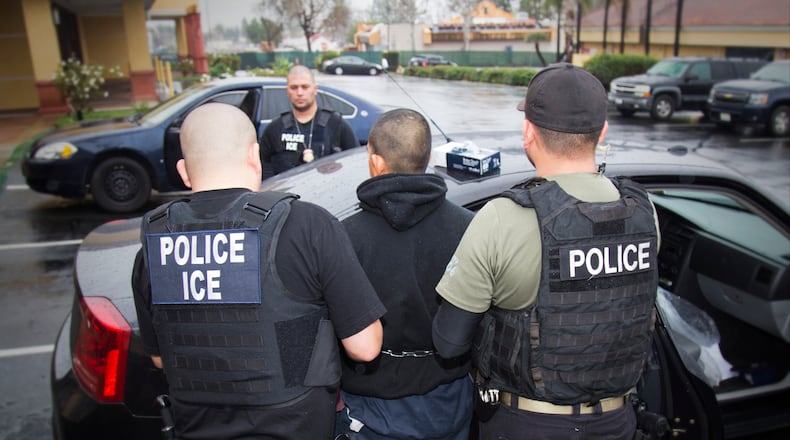For years, Jose Hernandez showed up for routine meetings with federal immigration authorities in downtown Atlanta, something he was ordered to do after his 2013 conviction for driving without a license.
They were keeping tabs on Hernandez, who entered the country without authorization more than two decades ago. After a brief discussion about his case, Hernandez would be on his way, allowing him to maintain his home in Marietta, run his painting business and raise two children, including a U.S.-born son.
Then it happened. He was locked up when he showed up for a March 9 appointment with U.S. Immigration and Customs Enforcement at a nondescript government building. Hernandez — who wasn’t a priority for removal during the Obama administration — is now facing deportation.
MORE: Here is every executive order Donald Trump has signed
TRUMP CRACKDOWN: Fear sets in among Atlanta immigrants
In January, President Donald Trump issued an executive order broadly expanding the pool of people prioritized for deportation. The Republican's get-tough approach drew widespread scrutiny a month later when deportation officers spread out across the nation and rounded up hundreds of unauthorized immigrants. But ICE has been employing another tactic that has drawn far less attention: Waiting for their targets to come to them.
Hernandez’ attorney says such deportations could drive more unauthorized immigrants deeper into the shadows.
“He was compliant all along with whatever conditions ICE put on him,” said Hiba Ghalib, his immigration attorney. “When his friend hears about his detention, why would he comply with ICE’s request to go and check in?”
Trump’s supporters are applauding the government, saying the rule of law must be upheld and that the president is following through on his campaign promises to crack down on illegal immigration.
“They are here illegally,” said Dr. Bill Hudson, a retired dentist, conservative activist and Trump supporter from Marietta. “And if they are here illegally, they need to go back and do it the right way — go back to their country of origin.”
Hudson faulted the Obama administration for letting people like Hernandez remain in the country: “It wasn’t right for the country to let them stay here in the beginning.”
ICE could not immediately quantify how often it has taken this approach since Trump issued his executive order in January. But several similar cases across the country have drawn headlines in recent weeks. For example, The New York Times reported a Mexican national — who entered the U.S. without authorization 21 years ago, married and gave birth to two children who are now in their teens — was deported to Mexico this year after showing up for her check-in with ICE in Phoenix. And last month, The Washington Post reported that another woman, a mother of six children who is married to a U.S. citizen, was told she must return to Mexico this summer after showing up for her appointment with ICE in Chicago. She entered the country without legal permission 18 years ago.
ICE is now tracking roughly 67,000 unauthorized immigrants through the Alternatives to Detention program, which allows them to remain at large under certain conditions, including requirements to wear electronic monitoring bracelets and to show up for regular face-to-face meetings with authorities.
Asked why Hernandez was being deported, ICE pointed to a misdemeanor battery conviction in DeKalb County. That conviction stemmed from a fight in the early 1990s with a former coworker who owed him money, said Hernandez’ stepdaughter, who spoke on condition of anonymity based on fears that ICE would retaliate against her.
RELATED: Federal judge in Hawaii halts Trump’s new travel ban
IN DEPTH: Georgia’s Ellis Island braces for Trump travel ban
“ICE will no longer exempt classes or categories of removable aliens from potential enforcement,” ICE spokesman Bryan Cox said in a prepared statement. “All of those in violation of the immigration laws may be subject to immigration arrest, detention and, if found removable by final order, removed from the United States.”
ICE also said that Hernandez had been deported in 1990 and had illegally returned to the U.S. But his stepdaughter denied that. While he had been ordered deported that year, she said, he did not receive notice of the order and never left.
In a letter he wrote ICE in February, Hernandez said he been in the U.S. since 1989 and had been paying taxes annually. Hernandez sent that letter after ICE told him to return to its downtown Atlanta office on March 9 with a plane ticket to Mexico. His wife, his children, many of his friends and Catholic mission official in Lilburn sent letters of support to ICE. But the government ultimately denied his request to stay his deportation.
“My whole family will suffer significantly and tremendous hardship if I were to get deported,” Hernandez wrote ICE. “The fear and worriedness I see in them is very stressful and heartbreaking.”
Hernandez, who turned 51 on Wednesday, is being held at the Stewart Detention Center, located more than 140 miles south of Atlanta. His stepdaughter – who has received a special reprieve from deportation through the Obama administration’s Deferred Action for Childhood Arrivals program – recalled the day she dropped him off for his meeting with ICE in downtown Atlanta last month. Nervous yet hopeful, he walked into ICE’s office building. He didn’t return.
“I couldn’t believe what was happening — that I was leaving there without him,” she said, her voice cracking with emotion, “and I would have to come home and tell my brother that his dad was no longer going to come home.”
About the Author
Keep Reading
The Latest
Featured




